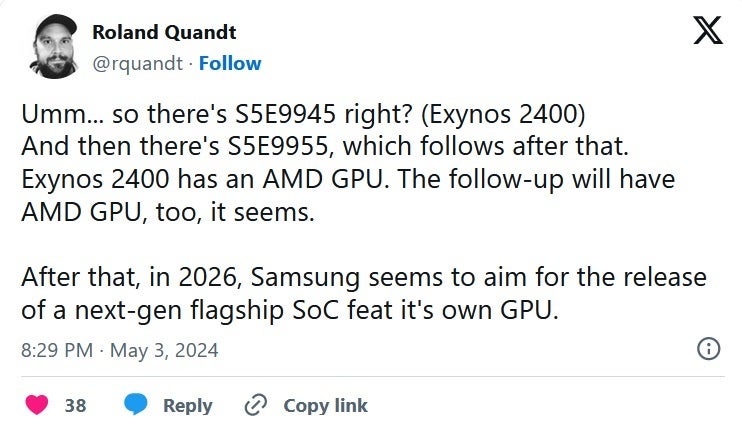Bye AMD? Samsung reportedly plans to use in-house GPU starting with Exynos 2600 SoC

The Exynos 2500 chipset should be unveiled this year and if things go as planned, it will be the first Samsung application processor (AP) to be produced by Samsung Foundry using its second-gen 3nm process node. It also could be more efficient than the competing Snapdragon 8 Gen 4 because the latter SoC will be manufactured by TSMC using its second-gen 3nm node (N3E). Samsung Foundry is a year ahead of TSMC as it uses Gate-All-Around (GAA) transistors on its 3nm silicon, something that TSMC will not use until it starts producing at 2nm next year.
Using GAA technology now makes the Exynos 2500 SoC more efficient than the Snapdragon 8 Gen 4. With GAA transistors, horizontal nanosheets are stacked vertically allowing the gate to touch the channel on all four sides which reduces current leakage and improves the drive current resulting in superior electrical signals that pass through and between the transistors. The bottom line is that GAA leads to better chip performance.

Leaker Quandt says Samsung will use its own GPU on the Exynos 2600 SoC
Each iteration of Samsung's Exynos chipset takes the line closer to the performance of Qualcomm's Snapdragon APs. And there is also going to be a big change in the Exynos 2600's spec sheet. According to well-known leaker Roland Quandt (via GizmoChina), the Exynos 2600 will feature Samsung's own GPU instead of the RDNA GPU supplied by AMD.
The next Exynos chipset, the Exynos 2500 with an AMD GPU, will power the 2025 flagship Galaxy S25 and Galaxy S25+ models in most markets. In the U.S. and China, the Galaxy S25 and Galaxy S25+ will be powered by the Snapdragon 8 Gen 4 which includes Qualcomm's own Adreno GPU. The Galaxy S25 Ultra will feature the Snapdragon 8 Gen 4 chipset in all markets.
If Quandt is right, the use of Samsung's own GPU will start with the Exynos 2600 SoC that would be expected to drive the Galaxy S26 and Galaxy S26+ in most regions. There is plenty of time for Samsung to develop the in-house GPU. The more competitive Samsung can make its Exynos APs compared to Qualcomm's Snapdragon chips, the more likely it is that Samsung could power the entire flagship line with its own Exynos silicon which could save the company, and possibly even consumers, some hard-earned cash.










Things that are NOT allowed: